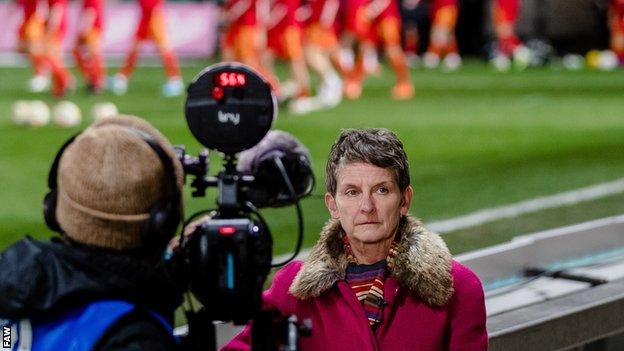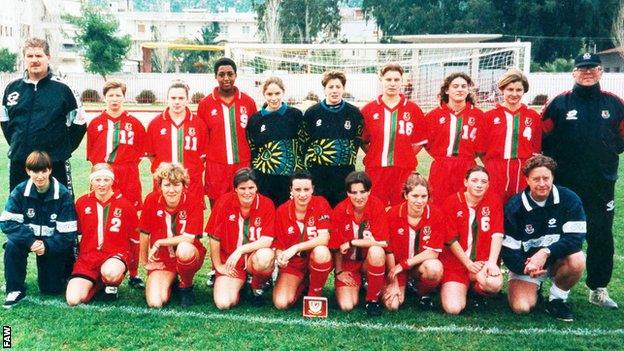Laura McAllister: Story of ex-Wales captain aiming for election to Fifa Council
- Published

Laura McAllister played in every Wales game from 1994 to 2001
Laura McAllister could soon be one of the most influential women in world football.
On Tuesday, the former Wales captain stands for election to be Uefa's female representative on the Fifa Council, the sport's ultimate decision-making body.
McAllister, a footballer turned professor of politics and sports governance, is aiming to become the first Welsh person to be elected to the Fifa Council - and the first woman from any UK nation to sit at football's top table.
"Firsts do not have any great consequence in their own right, but I think it tells you where we are with diversity of governance in football," McAllister tells BBC Sport Wales.
"And I think as somebody who's got credibility from having played the game, I'd be able to speak authoritatively, I hope, for all aspects of football."
McAllister's opponent will be the incumbent Evelina Christillin, an Italian former skier and Winter Olympics official with connections to powerful footballing figures such as Juventus chairman Andrea Agnelli.
Whereas Christillin's Fifa profile lists no direct football roles other than her current one on the council, McAllister hopes her playing background and experience in sports governance will set her apart.
McAllister chaired Sport Wales for six years, sat on UK Sport's board for a period which included the 2012 London Olympics and she has served as deputy chair of Uefa's women's football committee since 2017.
Her task in Switzerland on Tuesday will be to convince Uefa's 55 member nations that those credentials are enough to secure their votes.
As McAllister prepares for the moment of truth, BBC Sport Wales charts her career and speaks to those who were there for her journey from general elections to captaining her country and transforming women's football in Wales.

Football was McAllister's first love. Born in Bridgend in 1964, she would kick a ball around the garden with her father and go to watch Cardiff City matches with her grandfather.
But before that passion blossomed into an international career, McAllister was making a name for herself as a young politician.
Having graduated from the London School of Economics, the then 22-year-old stood as a Plaid Cymru candidate for Bridgend in the 1987 general election.
"She made a huge impression on me," Plaid's leader at the time, Lord Dafydd Elis-Thomas, tells BBC Sport Wales.
"Here was somebody from Bridgend, who was very interested in the whole Wales issue and the development of that area, was interested in the Welsh language as well.
"She was also totally committed to sport, to women's issues, equality, but also to do that in a way which didn't put people off.
"Laura has always had great skills of communication. She will make a case for something and get the ideas that she proposes through a group of people, through gradual discussion and through her intellectual quality because she's a hugely intelligent person to deal with. Her career in all its variety proves that."

Laura McAllister was Plaid Cymru's youngest candidate in the 1987 general election
McAllister was unsuccessful in the general election but that was just the start of her political career.
She completed a PhD in politics at Cardiff University, became professor of governance at the University of Liverpool Management School and would later return to Cardiff University as professor of public policy, forging a reputation as a respected political commentator.
As McAllister was establishing herself in the political world, she combined her professional work with a football career.
While studying at LSE, she played for Millwall Lionesses and, after moving back to Wales, she joined Cardiff City Ladies, where she spent 12 years.
It was during that period when McAllister started playing for Wales - and helped transform women's football in her homeland.

Women's football in Wales in the early 1990s was unrecognisable from the rapidly growing sport it is today. The Football Association of Wales had not even entered a team to qualify for the 1991 World Cup.
McAllister successfully lobbied the FAW to grant recognition for an international team, but that was far from the end of her campaign.
While McAllister and her inexperienced team-mates took on formidable opposition in the form of Germany and other nations with infrastructures for the women's game, they had to do so with old, ill-fitting kits and without even the most basic financial support.
"Back then there were no expectations," says Kath Morgan, McAllister's former Wales team-mate.
"In fact, as players we were just hoping and praying that we wouldn't lose by too many. We all worked really hard for each other and there were no egos because we just felt so fortunate to be actually standing in a line singing the anthem, even in XXXL men's shirts.
"Laura was at the forefront of trying to establish equality and fairness within the FAW.
"She was pushing the FAW, in a friendly way but making the point that we needed to be treated with respect. As per the men, we needed kit which fitted us, we needed more preparation time. Don't get me wrong, we were banging our heads against the wall in those days.
"But Laura was a voice of reason. When I shouted at people, I was a bit of a maniac really but Laura was level-headed. Laura could do it properly.
"Somebody has to start that history. The girls now, they get so much more, they get paid to a certain degree and we didn't even used to get petrol money."
On and off the field, McAllister had a tenacious work ethic.
Morgan would go on to become the first woman to win 50 caps for Wales, and she believes her longevity had much to do with her early encounters with McAllister.
"For me, she was an inspirational figure," Morgan says.
"She was the fittest person I've ever met. She took me under her wing and made sure that I understood how the fitness element was so important.
"I think Laura would be the first one to admit that technically she wasn't the best footballer. But she instilled in me that if you worked really hard and you were really fit it would be hard for people to take the shirt off you.
"We used to run together and the pain of those sessions… I've got goosebumps now just thinking about it."

Laura McAllister (back row, second right) and Kath Morgan (front row, second left) before Wales' game against Greece in the 1996-97 season

McAllister, Morgan and their team-mates blazed a trail for the women who would wear the Wales shirt after them.
There is still much work to be done in the pursuit of equality between men's and women's football in Wales - and across the world - but there has been a marked improvement in recent years.
In their two previous campaigns under Arsenal great Jayne Ludlow, Wales came closer than ever before to qualifying for a major tournament.
Now in Gemma Grainger, Ludlow's successor, Wales have a first manager solely in charge of the senior team, as opposed to her predecessors who also had to oversee age-grade sides and other aspects of the FAW's provisions for the women's game.
Wales' first team now also boasts a number of world-class, professional players such as Chelsea's Sophie Ingle and OL Reign midfielder Jess Fishlock, the first Welsh footballer to earn 100 caps.
Fishlock believes McAllister's election to the Fifa Council would have major benefits for football, and not only in Wales.
"It would be huge," Fishlock says.
"Laura has worked with Sport Wales and helped govern companies and other sports. She sees the problems and solutions from a wider scale.
"Within Fifa itself, those people can really make a big difference.
"For us as a nation, it would be huge to have someone on that kind of council for such a big governing body.
"We've said for ages, with some of the people in charge, it just needs to change and it needs a different outlook and mentality and attitude. It's about time that started to happen.
"Laura going on there, for me personally, starts that change.
"Also with Laura, she played. She's from a very small nation so she understands the things that are really hard and had to help not just the bigger nations but also the small ones, who sometimes need a bit extra.
"She has experience with that, and it helps with empathy and compassion when you've experienced it. So I hope people see that and vote for change because I feel like that's very important."
McAllister already has the support of all British football associations, and she has received glowing endorsement from the likes of former Liverpool and Wales striker Ian Rush and Chelsea's Danish forward Pernille Harder.
Now she needs the votes of Uefa's 55 member nations in order to join the 37-strong Fifa Council, led by Fifa president Gianni Infantino.
McAllister describes herself as the underdog against Christillin, recognising that "trying to unseat an incumbent from a big football nation is a very big ask".
But that is a role she has always relished, from a young outsider in a general election to giving Welsh women a voice in their attempts to establish their national team.
McAllister has built her career, in all its variations, on being a force for change. And Tuesday's election could see her bring about her most meaningful change yet as she aims to make history.